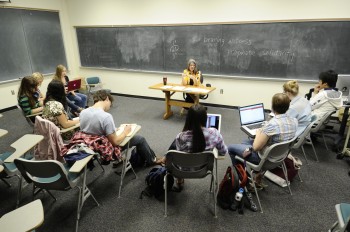Health Studies Minor Launches

Kaye Edwards, associate professor of Independent College Programs, will direct the new multidisciplinary health studies program.
Details
Some of the most complex and urgent questions facing society today involve health and healthcare. Among the issues globally: How to stem disease outbreaks; improve health outcomes; and expand access to basic care. Playing out on our own national stage are fierce debates about choice, responsibility, the high costs of health care and who will pay them.
Now, the new Bi-College Multidisciplinary Health Studies Program will allow students to consider a wide variety of issues around health and healthcare in a focused way.
Launched with the start of the spring semester, the program offers students in any major an opportunity to minor in health studies. The minor encompasses a one-semester introductory course that is team taught by two faculty members from different disciplines; a capstone seminar, also team taught, that will feature distinguished speakers in the field of health studies; and four courses to be selected by students from an approved list of courses offered at Haverford and Bryn Mawr.
“There are health studies majors and minors developing at colleges across the country,” says Associate Professor of Independent College Programs Kaye Edwards, who directs the new program.“But what makes us distinctive is that we are deliberately multidisciplinary across all three academic areas. We have a natural science, a social science, as well as a humanities focus.”
Currently, more than 30 students are enrolled in the introduction to health studies course, which was offered for the first time this semester and is being taught by Visiting Assistant Professor of Anthropology Christopher Roebuck, and Edwards, who received her Ph.D. in in molecular, cellular, and developmental biology, and did post-doctoral work in tropical parasitology.
Edwards, who came to Haverford in 1986, has brought her interest in social justice to her teaching with such courses as“Disease and Discrimination,”“Violence and Public Health,” and“Epidemiology and Global Health.” In January, students in her two-semester“Reproductive Health and Justice” class traveled to Nicaragua and visited maternity centers, hospitals and community organizations, and met with health officials, care providers and activists.
Edwards says she and her counterparts at Bryn Mawr used the Tri-College Program in Environmental Studies, also multidisciplinary in its approach, as a model for the health studies minor. “They were incredibly helpful as we worked on planning this,” says Edwards, who, in the past has served as an advisor to students who have pieced together their own independent majors or minors in public health or health studies.
“The new health studies minor now offers students a coherent structure,” she says.“The introductory course gives them a grounding—a shared vocabulary— and the capstone seminar experience will allow a group of students to examine health problems using a variety of methodologies: They can approach a health issue from statistics, or economics or ethics, or they can look at its biological basis.”
“Many of our students who are interested in health don't necessarily want to be a nurse, or a doctor or a care provider,” Edwards says.“They are interested in the policy issues, and the educational issues. Or, they are interested in health care management, or in becoming a medical anthropologist. The health studies minor will allow them to go in many different directions.”
—Eils Lotozo



